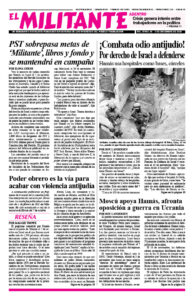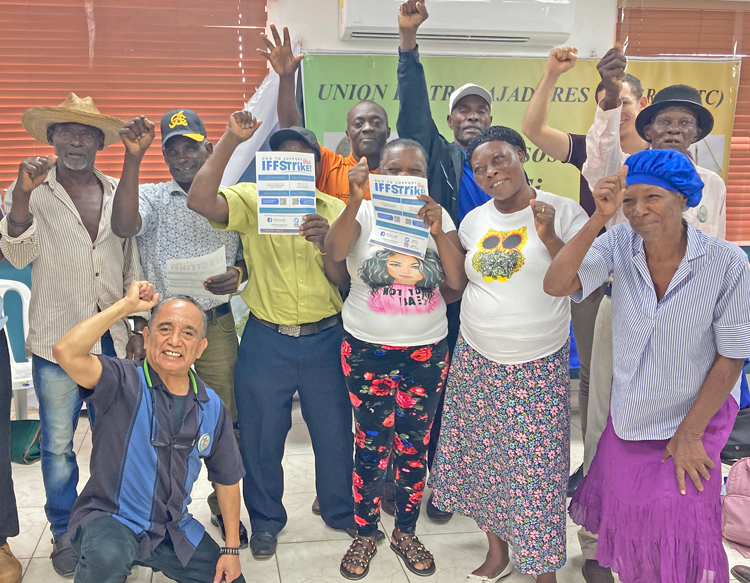SANTO DOMINGO, Dominican Republic — Members and supporters of the Sugarcane Workers Union (UTC) held a conference here Nov. 6-11 to discuss and win support for their fight for retirement pensions.
Dozens of Haitian and Dominican sugarcane workers, women as well as men, traveled long distances each day from different sugarcane communities (bateyes) around the country to take part. International guests from the United States, Canada and Uruguay also participated.
Founded in 2009, the UTC has mobilized thousands of sugarcane workers in more than 450 marches and pickets at the Presidential Palace, National Congress, Ministry of Labor and Social Security offices to demand pensions, medical care and rights for undocumented Haitian immigrants and their Dominican-born descendants. They have won broad sympathy among workers, as has their initiative to organize both Dominican and Haitian workers regardless of their legal status. Their slogan, “Without sugarcane workers there is no sugar!” is very popular.
While the UTC has won pensions for hundreds of workers and made other gains over the last 14 years, it has had to fight every government administration, which loyally defends the interests of the sugar barons and other capitalists.
“The picture has been even more grim under current President Luis Abinader,” said Jesús Núñez, UTC’s national coordinator, at the opening of the event. “Haitian immigrant sugarcane workers are not even being allowed to apply for long-overdue pensions,” he explained. “There is also growing anti-immigrant demagogy peddled by the Abinader government and other bourgeois politicians.” The number of Haitians who have been deported has risen sharply.
Fighting for our rights
Thousands of sugarcane workers and their families are affected by the discriminatory practices of the government and the sugar companies. The majority are Haitian immigrants and their children and grandchildren born here, but denied citizenship and subject to deportation.
Many conference participants have been working in the cane fields for decades, some going back to the 1960s. Thousands came originally as part of binational agreements to supply contract labor. Haitian migrant workers were assigned by the Dominican government agency overseeing the sugar industry an employee card, known as a ficha, with a number used to track a worker’s contribution to their retirement fund.
“Now they are being told that the fichas are not good to apply for their pensions,” Micely Díaz Espaillat, author of a report on the issue, told the conference. If the cards “were good to take the money from them they should be good for them to get their pensions.”
“They take your application and throw it at the bottom of the pile,” said Andrés, who is 80 years old and has been waiting 14 years for documents required by authorities.
“Our struggle is for a right we are entitled to,” said Núñez. “The government is now demanding a national ID card that it denies to undocumented Haitian workers.”
Solidarity from U.S. workers
Among international guests at the conference were Gerardo Sánchez, an organizer for Local 111 of the Bakery, Confectionery, Tobacco Workers and Grain Millers union in Dallas-Fort Worth; Rachele Fruit, a hotel worker and member of Local 355 of UNITE HERE in Miami; and Róger Calero, from New York, who along with Sánchez and Fruit is a member of the Socialist Workers Party. Fruit is also the SWP’s 2024 candidate for U.S. Senate from Florida. Many of her co-workers in Miami are Haitians and were glad to hear that she was bringing solidarity to the cane workers.
Sánchez brought a message to the conference from David Menefee, financial secretary-treasurer of Local 111.
“We send you our greetings, solidarity, and appreciation” for inviting a member of our local, read the message. It “has encouraged us to learn more about your struggles in the Dominican Republic” and “in Latin America.”
“We look forward to sharing with you the experiences of our union in struggles around the United States, like the ongoing strike of workers at International Flavors and Fragrances,” in Memphis, Tennessee.
In return, sugarcane workers at the conference voted to send a solidarity message to striking IFF workers, which they enthusiastically lined up to sign. “We have learned about the struggle at IFF,” it reads. “We are also fighting for safer working conditions, better pay, pensions and against discrimination.”
Conference participants were interested in the descriptions of struggles by working people against the devastating consequences of the capitalist crisis in the U.S. and Canada.
“Thousands of workers in the U.S. have begun to fight to defend themselves from conditions that make it impossible to raise a family. The birth rate is down, as well as life expectancy,” Róger Calero said. Many participants nodded in agreement.
Calero and the other SWP members at the conference described the work they are doing to build unions and revolutionary parties that can lead the working class to take political power.
They explained the stakes involved for the working class worldwide in opposing Moscow’s invasion of Ukraine, and the massacre of Jews by Hamas in Israel on Oct. 7 and the ensuing explosive rise of Jew-hatred around the world. “As in the 1930s, the ultimate target of these Jew-hating reactionary forces is the working class itself,” Calero said. “Jew-hatred will be used to spearhead attacks against the labor movement and its vanguard. Unions must be part of the fight against it.”
A feature presentation was made by Rafael Chaljub Mejía, an author and a leader of the Communist Party of Labor, who spoke about the impact of U.S. interventions in the Dominican Republic on the development of the sugar industry and the labor movement.
“Simultaneous with the land grabs and expulsions of peasants off the land and consolidation of capitalist production around sugar, also came the development of the working class,” he said. This history has been marked by several periods of strikes and uprisings by workers and peasants, including a sugarcane workers strike during the 1965 popular rebellion that was crushed by a U.S. invasion of 42,000 troops.
Several speakers also addressed the need to build and strengthen unions as they exist today, rather than form separate unions.
“The labor movement needs to be rebuilt,” Chaljub said. “A tiny amount of workers are in the unions in the Dominican Republic. And you have separate union federations fighting for the same demands in the same country.”
“A key question for building the labor movement in the U.S. is the fight for amnesty for undocumented workers, and the need to reject bosses’ attempts to divide workers, as we strengthen efforts to organize the unorganized,” said SWP candidate Fruit. “This is true everywhere.”
As part of the conference activities, international participants visited several bateyes that belong to the Central Romana Corporation, a giant sugar and real estate emporium, known for its anti-union practices. The Militant will have further coverage on the visit in the next issue.


